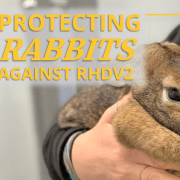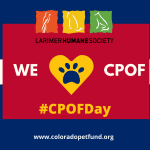You may have recently read about a threat to rabbits, both domestic and wild, known as Rabbit Hemorrhagic Disease Virus (RHDV2). A fatal virus, RHDV2 is not associated with coronavirus and only impacts species of rabbits and hares – it cannot be spread to other animal species or humans.
The virus surfaced in the wild rabbit population in early 2020, when a rabbit in New Mexico tested positive for the disease. Since then, RHDV2 has spread quickly into rabbit populations across Arizona, California, Nevada, Texas, and Colorado. Please keep in mind that officials now see positive tests coming back in both wild and domestic rabbits.
RHDV2 is exceptionally resilient and is spread to rabbits through direct contact, through the feces or blood of an infected rabbit, or through food or water sources that have come into contact with the virus. It can also be spread by humans (via handling or transmission from clothing or shoes) or other animals with contact with an affected rabbit and then interact with a healthy rabbit.
According to Larimer Humane Society’s Supervising Veterinarian, Dr. Lindsey Gapstur, “Due to the highly contagious and fatal characteristics of this disease, we recommend ensuring that pet rabbits do not have any direct or indirect contact with domestic rabbits outside of a home or any contact with wild rabbits.” Owners of domestic rabbits can help protect their pets by following prevention and cleaning protocols, including:
- Avoid all contact with domestic (outside of their current home), wild, or feral rabbits, whether alive or dead.
- Keep domestic rabbits isolated from interacting with other domestic rabbits, wild rabbits, birds, or other wildlife that may spread the virus.
- Ensure other domestic pets who may be exposed to wild rabbits avoid contact with pet rabbits.
- Wash hands before and after contact with domestic rabbits.
- Limit visitors coming into contact with your pet rabbit without protective clothing.
- Sanitize all equipment, tools, and supplies used in the care of your rabbit.
- Ensure your rabbit’s feed and bedding materials are safely stored away from opportunities for virus transmission.
- Keep your rabbit indoors if possible.
If you are the owner of a domestic rabbit, your veterinarian may have additional information for you regarding the prevention of RHDV2 and provide specific advice based on your pet’s specific situation and needs. Vaccines are available for RHDV2 at limited locations throughout the region. For questions about this vaccine, please reach out directly to your rabbit’s veterinarian.
At Larimer Humane Society, we practice rigorous cleaning and biosecurity measures to keep all animals safe and healthy, including a quarantine for all rabbits brought into our care. Due to the risk of spreading this disease, Larimer Humane Society is no longer accepting rabbit transfers from outside organizations. If you are interested in adopting a rabbit currently in our care, we are only allowing visits to families who have a serious interest in adoption and who don’t currently have a domestic rabbit in their home.
Our team of experts is keeping a pulse on RHDV2 and other diseases to maintain wellness within our shelter population and inform community members about issues that may impact their treasured companions.
Additional information on RHDV2 is available through the Colorado Department of Agriculture.





